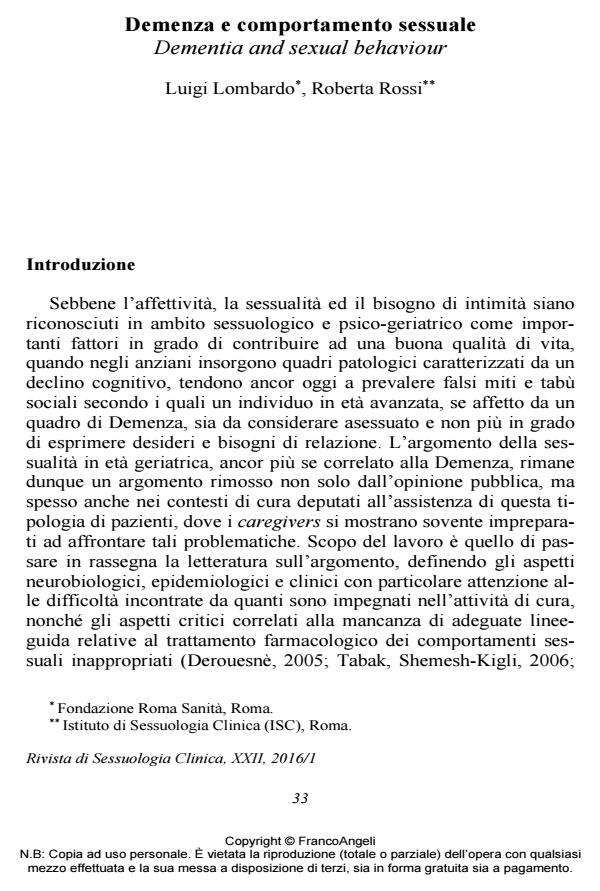Demenza e comportamento sessuale
Titolo Rivista RIVISTA DI SESSUOLOGIA CLINICA
Autori/Curatori Luigi Lombardo, Roberta Rossi
Anno di pubblicazione 2016 Fascicolo 2016/1
Lingua Italiano Numero pagine 18 P. 33-50 Dimensione file 276 KB
DOI 10.3280/RSC2016-001002
Il DOI è il codice a barre della proprietà intellettuale: per saperne di più
clicca qui
Qui sotto puoi vedere in anteprima la prima pagina di questo articolo.
Se questo articolo ti interessa, lo puoi acquistare (e scaricare in formato pdf) seguendo le facili indicazioni per acquistare il download credit. Acquista Download Credits per scaricare questo Articolo in formato PDF

FrancoAngeli è membro della Publishers International Linking Association, Inc (PILA), associazione indipendente e non profit per facilitare (attraverso i servizi tecnologici implementati da CrossRef.org) l’accesso degli studiosi ai contenuti digitali nelle pubblicazioni professionali e scientifiche.
Sebbene la sessualità, i sentimenti e l’intimità rimangano aspetti importanti della vita nelle persone anziane e nei soggetti affetti da Demenza, un falso mito persistente nella società vorrebbe i pazienti affetti da Demenza asessuati ed i desideri ed i bisogni di relazione come qualcosa di destinato a dissolversi con l’avanzare dell’età. In realtà la sessualità espressa da pazienti con Demenza può essere espressa, talora drammaticamente, sotto forma di comportamenti sessuali inappropriati (ISB). Sulla definizione di tali sintomi comportamentali, non c’è al momento, nella letteratura scientifica internazionale una concordanza di vedute, tuttavia gli ISB comprendono una qualsiasi forma di agito verbale o fisico messo in atto in un contesto socialmente inappropriato. Esempi di ISB sono: esposizione dei genitali in pubblico o nel luogo di ricovero, masturbazione in pubblico e forme di aggressione sessuale nei confronti di degenti, operatori o familiari tanto che questi aspetti sono spesso fonte di preoccupazione, imbarazzo e fatica per chi si relaziona con questa tipologia di pazienti. La ricerca e di conseguenza la letteratura disponibile sui trattamenti è al momento piuttosto limitata. Interventi di tipo non farmacologico (tecniche comportamentali, strategie di distrazione, terapia occupazionale) possono essere efficaci se personalizzate. Numerosi trattamenti farmacologici (con antidepressivi, antiandrogeni, antipsicotici, ed anticonvulsivanti) vengono utilizzati empiricamente, tuttavia solo poche evidenze sono disponibili nella letteratura scientifica riguardo l’efficacia e la consistenza degli effetti collaterali, tanto che non esistono chiare linee guida in grado di precisare quali siano da considerare trattamenti di prima o di seconda linea.
Parole chiave:Demenza, comportamento sessuale, malattia di Alzheimer, Demenza fronto-temporale, disinibizione, ipersessualità, comportamento aggressivo
- Social Issues Surrounding Harassment and Assault Vaitsa Giannouli, pp.625 (ISBN:9781522570363)
- Social, Psychological, and Forensic Perspectives on Sexual Abuse Vaitsa Giannouli, pp.207 (ISBN:9781522539582)
Luigi Lombardo, Roberta Rossi, Demenza e comportamento sessuale in "RIVISTA DI SESSUOLOGIA CLINICA" 1/2016, pp 33-50, DOI: 10.3280/RSC2016-001002